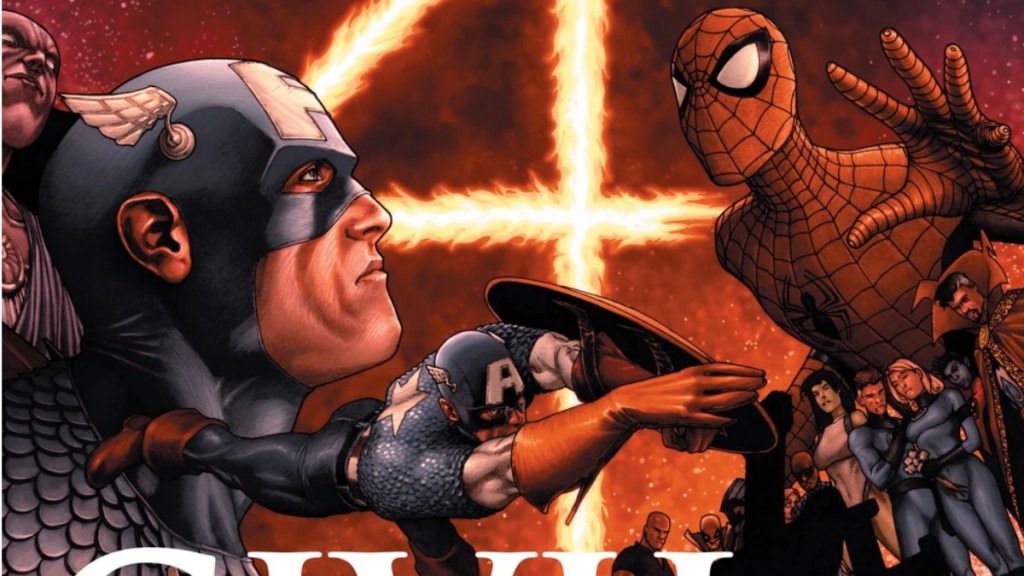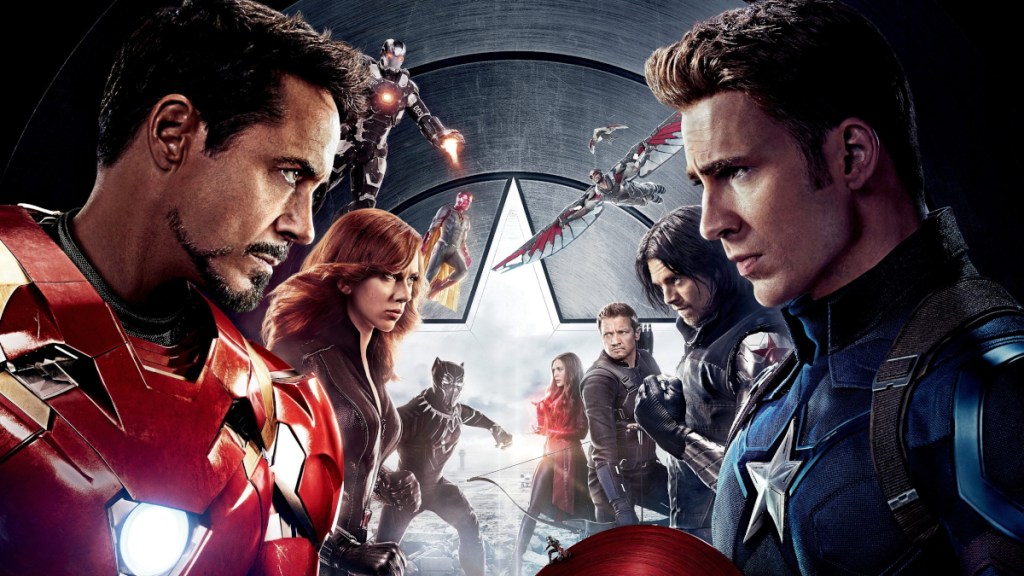Marvel went all-in on the events comics in the ’00s, and that lead to a story that would have massive repercussions, both in the comics and in the future Marvel Cinematic Universe: Civil War. Marvel was always a publisher that loved hero versus hero fights, and Civil War gave them that while setting up years of stories by setting Captain America and Iron Man against each, making the superhero community choose sides. 2016 would see Captain America: Civil War take the general premise of that comic and bring it to the big screen. Ever since then, arguments have been ongoing about which one is the best.
Videos by ComicBook.com
But while both the Civil War comic and Captain America: Civil War both have strengths, there’s one story that did the premise better. And which one might surprise you.
Civil War had some complicated characterizations

We’ll start with Civil War, since it was first. Written by Mark Millar with art by Steve McNiven, Civil War kicked off with a literal bang, as the New Warriors, a group of has-been youmg heroes trying to use a reality show to return to prominence, tackles a group of B and C-list villains. One of these villains, Nitro, uses his explosive powers to destroy the area around him, which included a school. This killed hundreds of kids and a national outcry caused the government to step in, creating the Superhero Registration Act. Captain America went against the SRA, and Iron Man supported it, which led to the titular battle. After various victories and losses, Captain America would surrender, ending the war, and allowing Iron Man to become Director of S.H.I.E.L.D.
Civil War‘s best aspect is the way it sold the conflict between heroes. Marvel’s heroes had battled each other many times over the years, but it rarely went as deep as it did in this story. They would squabble and fight, but always come back together. Civil War made it feel like they were never going to friends again. Cap and Iron Man had always had something of a rivalry, but it was friendly, which made their schism into a major problem. The turning point of the conflict was the introduction of Ragnarok, a Thor clone created by Mister Fantastic, Iron Man, and Hank Pym, who ended up killing the second Goliath. This stratified Cap’s side and made it impossible for the two sides to reconcile. Even after Cap’s surrender, there were holdouts who still wouldn’t sign the SRA and they continued to rebel against Iron Man and S.H.I.E.L.D. This weakened the superhero community, but led to some great stories.
This is pretty much the only pro for most readers of the story. The biggest problem that most people have with Civil War was the fact that it depended entirely on characters being written out of character. Captain America doesn’t always follow government mandates, but he and Iron Man are the best of friends; Cap would do everything he could to work with Iron Man. Iron Man was basically played as a fascist, which is completely out of character for him, as well. Iron Man wouldn’t have just swallowed the SRA without doing his best to make sure it was in the best interests of his friends. At this point in Marvel history, Cap and Iron Man had both been working with S.H.I.E.L.D. for years and the organization basically already knew everything about the superhero community anyway. All of these factors have made it so many longtime Marvel fans don’t really enjoy the comic.
[RELATED: How Your Friendly Neighborhood Spider-Man Connects to Captain America: Civil War]
Captain America: Civil War has a more personal story

Captain America: Civil War deviated significantly from the comic. The explosion and death of civilians was caused by Scarlet Witch and didn’t happen in the US. The movie took place after the Battle of Sokovia, which made the governments of the world much more ready to take the yoke of the superhero community. However, without the manipulations of Zemo, there’s a still a chance the Sokovia Accords never would have happened, and Zemo’s place in the movie gives it an extra dimension that the comic doesn’t have. In the movie, the conflict between Cap and Iron Man quickly becomes much more personal, all because of Winter Soldier and his role in the death of Iron Man’s parents, and the two sides go their separate ways. The movie ends with Cap letting Iron Man know that if Stark ever needed help, Cap and his allies would be there to help.
Captain America: Civil War has a lot of pros compared to the comic. For one thing, it includes one of the best Avengers action scenes ever, the battle at the airport. Iron Man and Cap are also portrayed completely in character in the film; their conflict doesn’t depend on mischaracterization as much as the comic. Adding the Winter Soldier to the story was also a great idea, as it allowed the more personal grudge between Cap and Iron Man, and kept the other heroes from hating each other. The introduction of Spider-Man and Black Panther also stand out in the movie; these are two of the best debuts in the Marvel Cinematic Universe, and their scenes in the movie are a lot of fun. The final battle between Cap, Iron Man, and Bucky is intensely personal, and the movie does a brilliant job of showing that.
The main con of Captain America: Civil War is the fact that none of it really feels like it matters. The airport fight is a great action scene, yet the two sides are obviously mostly holding back, with only Vision accidentally injuring War Machine being a big deal. Cap, Winter Soldier, and Iron Man’s battle is visceral, but both sides make a grudging peace by the end. There’s no real enmity and the Sokovia Accords feel like they’re an afterthought in a way that the SRA didn’t. Zemo is a cool villain, but his entire plan revolves around the heroes believing what could easily be lies; it doesn’t matter that it’s true that Winter Soldier killed the Starks, why should Iron Man, a man who questions everything, believe someone he’s never met? Captain America: Civil War introduces a group of Winter Soldiers, but does exactly nothing with them. It’s an efficient action scene generator, but honestly, the movie does everything it can to restore the status quo of the MCU by its end.
While It Has Its Problems, Captain America: Civil War Is Slightly Superior

The comic Civil War has some epic moments and great action scenes, but its problems outweigh all of that. Captain America: Civil War lacks the gravitas of the comic, but it does everything else better. The comic has a much better legacy; the division it sowed in the comics were felt for years, informing events like World War Hulk, Secret Invasion, the “Dark Reign” publishing initiative, Siege, and more. Meanwhile, Captain America: Civil War never truly feels like it matters after it ends. The MCU moved on and most of Phase Three’s movies were barely affected by it, other than perhaps Spider-Man: Homecoming and Black Panther. Avengers: Infinity War has the two sides still separate, but they quickly come together when the greater threat of Thanos comes as if nothing happened.
However, Captain America: Civil War is able to tell its story without completely ignoring the characterization of multiple heroes. Civil War was originally meant to be an Ultimate Universe event. All that was changed was the universe, and it shows in the way some of the characters act. Captain America: Civil War is able to tell a gripping, sometimes emotional story that introduced two of the best MCU characters ever, and had a final battle that still stands up over a decade later. The comic is good, but Captain America: Civil War is the superior story, something that is quite rare in the pantheon of adaptations.
Which take on Civil War do you prefer? Let us know your thoughts in the comment section!








